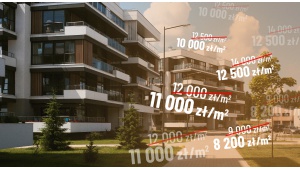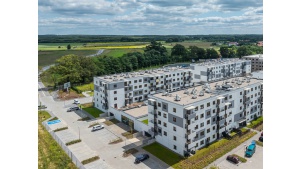Data centers have exceptional prospects in Poland
Prestige PR
Włodarzewska 81C lok 81
02-393 Warszawa
i.wisniewska|prestigepr.pl| |i.wisniewska|prestigepr.pl
508 927 958
www.prestigepr.pl
Bartłomiej Zagrodnik, Managing Partner, CEO of Walter Herz
The potential of data centers in Poland is growing. Do we have a chance to catch up with the European leaders? Investments in this sector are gaining momentum
The number of investments in various real estate sectors today varies significantly. However, the so-called alternative sectors are increasingly thriving in Poland. Given current market needs, the most promising growth opportunities are in the broadly defined living sector and in real estate investments related to the development of areas such as energy transition and data storage and processing. Data centers, in particular, have substantial potential for rapid development in Poland and for creating an asset class that will become competitive with standard sectors.
The global data center market is growing at an impressive rate, as evidenced by published data. In 2022, their global capacity was 4.9 GW, and by 2023, it had already reached 7.4 GW. In Europe, the largest hubs for the sector are located in London, Frankfurt, Amsterdam, Paris, and Dublin.
The Polish market is at the beginning of its journey, but its broad development scale is ensured by still lower project implementation costs, cheaper construction and land compared to Europe, and low saturation of this type of infrastructure compared to Western markets. The increasing demand for digital services translates into the growth of cloud computing and also influences the pace of data center investments in Poland, which has been particularly noticeable in the last four years.
The growth of the segment is now further driven by the development of artificial intelligence. AI is currently the turbine propelling the demand for computing power and data storage, thereby fueling the industry's investment growth. In Poland, investments in data processing centers dedicated to artificial intelligence are still in the preparation stage, but the scale of projects we have recently observed in this sector is truly significant.
It is estimated that there are over forty data centers in the country, with more than one-third located in Warsaw. Forecasts predict nearly a twofold increase in the capacity (currently 310 MW) of data centers operating in Poland over the next four to five years.
The acceleration in the industry is evident both in the number and value of projects. It is evidenced in the recent news. Atman company, whose main shareholder is Global Compute Infrastructure, recently signed a financing agreement worth PLN 1.35 billion for the expansion of its data centers. The loan, provided by six financial institutions, is the largest financing obtained so far in Poland for data center development. The capital is primarily intended for the construction of the new Waw-3 campus in Duchnice near Warsaw, which will house over 50 thousand servers in three buildings with a total area of nearly 19 thousand sq m., as well as for the expansion of the company's existing facilities. The first building, offering 14.4 MW of power, is expected to be completed in the last quarter of this year.
The first Data4 Group data center in Poland, with a capacity of 8 MW, was opened last year in Jawczyce near Warsaw. The second is scheduled to be completed by the end of this year. The expanded campus will eventually include four buildings with a total area of 50 thousand sq m. and a combined capacity of 60 MW, with a total investment cost of PLN 1 billion.
The first of two planned facilities has been operating at Vantage Data Centers' campus in Warsaw's Bielany district since 2022. Once fully operational, the complex will provide 48 MW of computing power across a total area of 36 thousand sq m.
Investment Process and Land
The question arises as to how strong a location Warsaw can become on the sector map, given its immense potential in Poland due to the presence of Microsoft and Google cloud regions. These companies have partnered with Chmura Krajowa (National Cloud) and are pledging significant investments. The necessity to keep data centers close to the end users, for reasons of security and data transfer speed, positively influences further investment growth in Warsaw. Additionally, the demand for digital services is the highest in the country in the Warsaw market.
However, due to the enormous demand for computing power now generated by artificial intelligence, for which location is not a constraint, regional centers and suburban areas may gain importance. This is particularly relevant since one of the requirements for the land suitable for data centers is the absence of neighboring condominium development.
Here we encounter the greatest obstacle for the industry, which is acquiring suitably prepared land. This refers to land that would enable achieving specific technical requirements for this type of investment and allow for the placement of necessary infrastructure in accordance with local regulations.
A crucial aspect in choosing a location is ensuring adequate connection with sufficient power to supply the data center. Large facilities consume tens of times more energy than warehouses and have substantial water requirements for their cooling systems. It should be noted that data centers designed in Europe already have capacities not in tens but in hundreds of megawatts.
Security provided by the location is also important. Data centers cannot be exposed to supply interruptions or power cuts. Additionally, they should be situated at specified distances from main roads, although adequate access to transport infrastructure is also vital.
Climate Challenges
Preparing such investments requires readiness for cooperation between energy network operators and data center operators in managing energy, to adjust load and ensure availability of both immediate and stored energy. The industry strives to maximize its use of renewable sources. European Union funds assist in expanding and modernizing energy distribution networks, aiming to enhance Poland's energy infrastructure.
Choosing an appropriate location for data centers is crucial under EU regulations aimed at reducing final energy consumption and requiring data centers to report key efficiency indicators. This includes reporting on energy consumption, heat dissipation, types of refrigerants used, and the flow of incoming and outgoing data.
This aspect mandates that all parameters related to greenhouse gas emissions and the impact of facilities on environmental quality be analyzed during the decision-making phase of planned investments, both in construction and during operation. Optimal solutions are sought for sustainable design in this regard.
Control over environmental factors is integrated into data center operations, prompting consideration of waste heat utilization, the thermal energy they generate, and opportunities for multi-sector collaboration to reclaim such resources. Data centers in Europe aim to integrate with local infrastructure to implement solutions that utilize the heat they generate, for example, in heating urban areas or supporting local business activities.

Deweloperzy ukrywają ceny mieszkań. Z troski o klientów czy swoje portfele?

Więcej przestrzeni, mniej hałasu – dlaczego Polacy coraz częściej wybierają przedmieścia?

Jak czytać rzuty mieszkań i uniknąć przykrych niespodzianek? AI ułatwia wybór
Więcej ważnych informacji
 Jedynka Newserii
Jedynka Newserii

 Jedynka Newserii
Jedynka Newserii

Handel

Polskie MŚP otrzymają większe wsparcie w ekspansji międzynarodowej. To cel nowej inicjatywy sześciu instytucji
Firmy z sektora małych i średnich przedsiębiorstw otrzymają kompleksowe wsparcie na potrzeby zwiększania konkurencyjności na arenie międzynarodowej. Taki jest cel wspólnej inicjatywy instytucji zrzeszonych w Grupie PFR pod szyldem Team Poland. Obejmuje ona zarówno wsparcie kapitałowe, w postaci gwarancji, pożyczek czy ubezpieczenia, jak i doradztwo oraz wsparcie promocyjne i informacyjne, dzięki czemu mikro-, małym i średnim firmom łatwiej będzie podjąć decyzję o ekspansji zagranicznej. Pierwszy projekt dotyczy wsparcia dla firm zainteresowanych uczestnictwem w odbudowie Ukrainy.
Bankowość
RPP zgodna co do potrzeby obniżania stóp procentowych. Trwają dyskusje dotyczące tempa tych decyzji

W lipcu Rada Polityki Pieniężnej po raz drugi w tym roku obniżyła stopy procentowe, określając swój ruch mianem dostosowania. W kolejnych miesiącach można oczekiwać kolejnych obniżek, ale ich tempo i termin będą zależeć od efektów dotychczasowych decyzji i wzrostu płac. Docelowo główna stopa procentowa ma wynosić 3,5 proc. Te okoliczności sprzyjają kredytobiorcom.
Handel
Umowa z krajami Mercosur coraz bliżej. W. Buda: Polska nie wykorzystała swojej prezydencji do jej zablokowania

– Polska podczas prezydencji w Radzie UE nie wykorzystała szansy na obronę swoich interesów w sprawie umowy z krajami Mercosur – ocenia europoseł PiS Waldemar Buda. W jego ocenie polski rząd, mimo sprzeciwu wobec zapisów umowy, nie zbudował w UE sojuszy niezbędnych do jej odrzucenia. Porozumienie o wolnym handlu spotyka się przede wszystkim z protestami europejskich rolników, którzy obawiają się zalania wspólnego rynku tańszą żywnością z krajów Ameryki Południowej. Według europosła wszystko może się rozegrać w najbliższych tygodniach.
Partner serwisu
Szkolenia

Akademia Newserii
Akademia Newserii to projekt, w ramach którego najlepsi polscy dziennikarze biznesowi, giełdowi oraz lifestylowi, a także szkoleniowcy z wieloletnim doświadczeniem dzielą się swoją wiedzą nt. pracy z mediami.




![Część środków z Planu Społeczno-Klimatycznego trafi na walkę z ubóstwem transportowym. Organizacje branżowe apelują o zmianę priorytetowych projektów [DEPESZA]](https://www.newseria.pl/files/1097841585/rower3,w_85,_small.jpg)




.gif)

 |
| |
| |
|